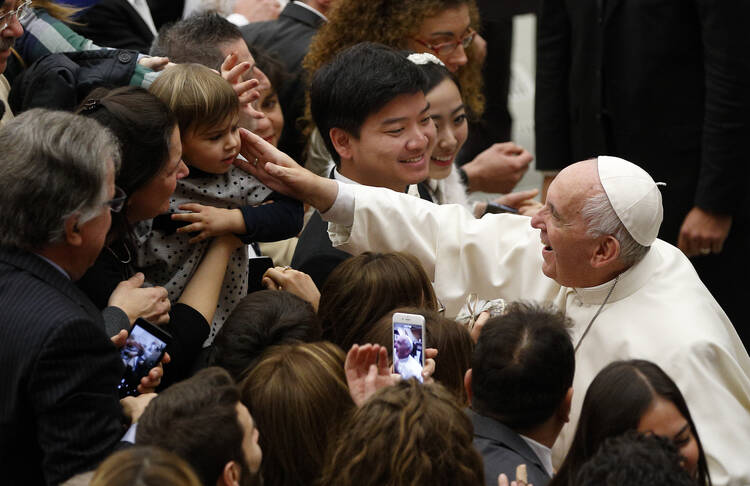For some years now there has been talk of a “reform of the reform” of the liturgy promulgated by Paul VI after the Second Vatican Council. Such talk became more vocal following Pope Benedict XVI’s decision in July 2007 to restore the “extraordinary” rite alongside the “ordinary” one. Moreover, more recently some prelates, including Cardinal Robert Sarah, prefect of the Congregation for Divine Worship, have given credence to this possibility and advocated that priests return to celebrating Mass facing the altar rather than the congregation.
Antonio Spadaro, S.J., asked Pope Francis what he thinks of such proposals when he interviewed him on July 9, four days after Cardinal Sarah had given a lecture in London calling for priests to implement this change at the beginning of Advent and affirming that a “reform of the reform” is underway.
Francis’ answer appears in the preface to the 1,000-page book Nei Tuoi Occhi È La Mia Parola (In Your Eyes Is My Word), a collection of his main talks and homilies as archbishop of Buenos Aires.
He began by affirming that Pope Benedict XVI (in his motu proprio of July 2007 “Summorum Pontificum,” on the use of the Roman Liturgy prior to the reform of 1970), “made a right and magnanimous gesture by going to meet some groups and persons with a certain mentality that had nostalgia [for the old liturgy] and were distancing themselves.”
He emphasized, however, that this was “an exception” and “for that reason it is referred to as ‘the extraordinary’ rite, but the ordinary rite of the church is not this.” Francis recognized the need “to go to meet with magnanimity the one who is attached to a certain way of praying,” but he stated clearly that “the ordinary rite is not this.”
He insisted that the Second Vatican Council and its “Constitution on the Sacred Liturgy”“must be carried forward as they are” and declared furthermore that “to speak of ‘the reform of the reform’ is an error!”
Probing further, Father Spadaro asked whether “apart from those who are sincere and ask for this possibility out of custom or devotion,” the desire for this rite “could also express something else.”
Francis responded: “I ask myself this. For example, I always try to understand what is behind persons who are too young to have experienced the preconciliar liturgy but who nevertheless want it. At times, I find myself in front of persons who are very rigid, an attitude of rigidity. And I ask myself: How come such rigidity?” And when one “digs” deeper, he said, one discovers that “this rigidity always hides something: insecurity, or at times something else…. Rigidity is defensive. True love is not rigid.”
Turning to the question of tradition, Father Spadaro noted that “some understand this also in a rigid way.” Francis responded, “But no: tradition blossoms!” Nevertheless, he said, “there’s a traditionalism that is a rigid fundamentalism; this is not good. Fidelity on the other hand implies growth. In transmitting the deposit of faith from one epoch to another, tradition grows and consolidates itself with the passing of time, as St. Vincent of Lerins said in his Commonitorium Primum.” And the Liturgy of the Hours, the pope pointed out, quotes St. Vincent: “The dogma of the Christian religion too must follow these laws. It progresses, consolidates itself with the years, developing itself with time, deepening itself with age.”
It is worth noting that on the day Pope Francis spoke with Father Spadaro, he also received in private audience Cardinal Sarah, who has emerged as the standard bearer of those who are pushing for a “reform of the reform.” Two days later, at the pope’s instruction, the Vatican spokesman, Federico Lombardi, S.J., issued a declaration stating that the “ordinary” form of the celebration of the Mass is the one envisaged by the Missal promulgated by Paul VI, while the “extraordinary” rite approved by Benedict XVI is not to take its place. Father Lombardi denied that new liturgical directives would be introduced in Advent and asked that the expression “reform of the reform” be avoided in referring to the liturgy. He revealed that Cardinal Sarah “expressly agreed to all this” in his meeting with the pope.
In a word, Francis wants the Second Vatican Council’s directives on the liturgy to be more fully implemented, not rolled back. It seems clear that he feels this has not yet happened.








